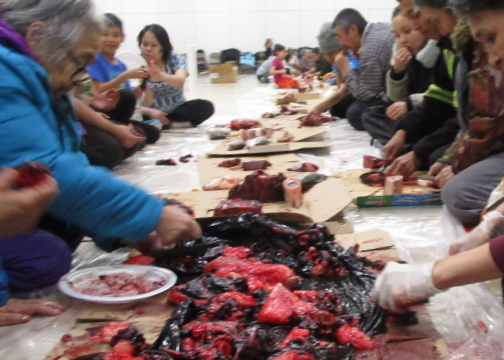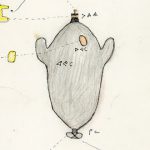Learning Outcome
Help students understand the importance of sharing food. That is how Inuit would save others, by sharing food. That’s why we are here today.
Inuit Code of Conduct for Society
This lesson is part of an Inuit Code of Conduct for Society, along with these other lessons:

Picture by Charlie Nowkawalk
How to teach this skill
- Students can read the elders’ stories or the teacher can read and explain them.
- After reading the stories, students can start discussing the differences of sharing food between the past and now.
- Talk to them about how Inuit back then thought sharing food was very important. You can use your knowledge and your experience to make it more understandable.
- So that the students can show respect by sharing food, and follow what the elders had said. Elders talks about their experiences and have lived long time and what they say is true.
- When students finish reading or are finished being read to, they can start writing their own thoughts and their understanding about how Inuit used to share food.
- They can also visit an elder, or have someone come to their class to talk about sharing food.
Traditional Inuit Words of Advice
ᑖᒃᑯᐊ ᐃᓄᒻᒪᕇᑦ ᐅᖃᐅᑎᔭᐅᒍᑎᒋᖃᑦᑕᓯᒪᔭᖏᑦ ᓂᕿᒥᒃ ᐊᕕᖃᑎᒌᑦᓯᐊᖃᔭᐅᖃᑦᑕᓯᒪᔪᑦ ᑌᒣᑦᑐᒥᒃ ᐱᐅᓯᖃᕐᑎᑕᐅᑦᓱᑎᒃ. ᑌᒣᑦᑑᓱᑎᒃ ᐊᓐᓇᐅᒪᒍᓐᓇᑐᕕᓃᑦ, ᐆᒪᔪᓄᑦ ᑭᓯᐊᓂ ᐊᓐᓇᒍᑎᖃᕐᓱᑎᒃ, ᐊᕕᖃᑎᒌᑦᓯᐊᕋᒥᓪᓗ ᐃᓅᖃᑎᒥᓂᒃ ᐊᓐᓇᑎᑦᓯᓱᑎᒃ. ᑌᒫᒃ ᐱᐅᓯᓕᕕᓃᑦ.
Elders were told to always share their food with others and, this was mandatory. That way they could survive.They would survive by sharing animals. That was their way.
Sharing Food
- ᐃᓄᐃᑦ ᓯᕗᓪᓕᕗᑦ ᓂᕿᒥᒃ ᐊᕕᖃᑎᒌᓐᓂᒥᒃ ᐱᐅᓯᖃᕐᑐᓴᔭᑐᙯᑦ, ᓂᕿᒥᒃ ᑭᓯᐊᓂ ᐃᓅᒍᑎᖃᕈᓐᓇᓚᐅᕋᒥᒃ.
Our ancestors shared food as a tradition, because life was based around food.
- ᐃᓅᔪᒍᑦ ᐊᕕᖃᑎᖃᓐᓂᒥᒃ ᐱᐅᓯᖃᕐᑐᓴᔭᑐᖃᐅᔪᒍᑦ. ᓯᕗᓕᕗᑦ ᐊᕕᖃᑎᒌᓐᓂᒥᒃ ᐱᐅᓯᖃᕐᑐᑐᖃᐅᓯᒪᔪᑦ ᐃᓅᖃᑎᒥᓂᒃ ᐱᑎᑦᓯᓂᕐᒥᒃ, ᓱᓇᐅᒐᓗᐊᕐᐸᑦ, ᓂᕿᐅᑉᐸᓗ. ᐁᑦᑑᑎᖃᑐᐃᓐᓇᓂᕐᒥᒃ ᐊᑭᖃᕐᑎᓇᒍ ᐱᐅᓯᓕᑐᖃᐅᔪᑦ. ᐱᐅᓯᕆᔭᐅᑦᓱᓂ ᐃᑲᔪᖃᑎᒌᒍᑎᒋᑦᓱᓂᐅᓪᓗ, ᐊᓕᐊᒋᑦᓱᒍᓗ, ᐃᓅᓯᑦᓯᐊᒍᑦᓱᓂᓗ. ᐃᓅᑉ ᐃᓱᕐᕆᓯᕈᓐᓇᓂᖓᓄᑦ ᐃᓕᖓᔪᖅ.
As Inuit, we share food as a tradition. Our ancestors shared, by giving to others, whether it was food or otherwise. Giving anything without anything expected in return. Helping others was their pride, and their way of life. People do this to have peace.
- ᓯᕗᓪᓕᕗᑦ ᐊᕐᓱᕈᓐᓇᑐᒦᑦᑐᐊᓘᒐᓗᐊᕋᒥᒃ, ᓂᕿᓗ ᒥᑭᔪᐊᐱᐅᒐᓗᐊᕐᒪᑦ ᐊᕕᑦᓯᐊᑕᐅᕙᑦᑐᕕᓂᖅ, ᐱᔪᑑᔪᖃᕆᐊᖃᕐᑎᓇᒍ ᐃᓅᓯᖃᕐᑐᕕᓃᑦ. ᐆᒪᔪᕆᐅᕐᑐᖅ ᐱᓪᓚᕆᐅᑎᑕᐅᓐᓂᒪᑦ ᐱᔭᕆᐅᕈᑎᖓ ᐊᕕᖃᑎᒌᑦᓯᐊᕆᐊᖃᕐᓂᒧᑦ ᑐᑭᖃᕐᑎᑕᐅᔪᕕᓂᖅ. ᐊᔪᕐᓴᓕᑐᐊᕋᒥᑦ ᓱᒐᓗᑦᓱᑎᒃ ᓱᓇᑐᐃᓐᓇᒥᒃ ᐊᕕᖃᑎᖃᑦᓯᐊᐸᑦᑐᕕᓃᑦ, ᐃᒻᒥᓂᑐᐃᓐᓇᖅ ᐱᒍᒪᓂᑐᐃᓐᓇᒥᓂᒃ ᐃᓱᒪᒐᑎᒃ. ᑌᒪᖕᖓᑦ ᐱᐊᕋᐅᓂᖓᓂ ᐊᕕᖃᑎᖃᕆᐊᖃᓐᓂᒥᒃ ᖃᐅᔨᒪᑎᑕᐅᕙᑦᓱᑎᒃ ᐊᕕᖃᑎᖃᑉᐸᓱᑎᒃ. ᐊᓕᐊᑦᓱᑎᓪᓗ ᐊᕕᖃᑎᖃᕆᐊᒥᒃ ᐃᓄᐃᑦ ᐱᐅᓯᓕᑦᓴᔦᑦ.
Even when our ancestors were going through tough times, and food was scarce, they would share it. No one was allowed not to share. It was very important when a person caught their first animal that they share it with everyone. Especially when they were in need, they would share whatever they had, without thinking only of themselves. When children were still small, they taught them to share. And that’s why Inuit love to share.
- ᐃᓄᐃᑦ ᐃᑲᔪᕐᑎᒌᑉᐸᓚᐅᕐᑐᑦ ᐅᓪᓗᑕᒫᑦ ᓂᕿᑎᒍᑦ. ᐊᖑᑏᑦ ᐆᒪᔪᑐᐊᕋᒥᒃ ᐊᕕᐅᕐᖃᓯᐊᕐᓱᒋᑦ ᓂᖏᕐᑎᓯᕙᓚᐅᕐᑐᑦ ᐱᔪᑑᓂᐅᔭᕋᑎᒃ. ᓄᓇᕐᖃᑎᒋᖕᖏᑕᕋᓗᐊᒥᓂᒃ ᓂᕿᑎᒍᑦ ᐸᔪᑉᐸᓚᐅᕐᑐᑦ, ᖃᓪᓗᓂᑦᔨᐊᑐᕕᓂᒐᓭᑦ ᓂᐅᕕᕐᕕᑕᓕᒧᑦ ᐊᕕᖃᑎᖃᑉᐸᓚᐅᕐᑐᑦ, ᓴᓇᐅᒐᕐᒥᓘᓐᓃᑦ (ᓂᕿᑦᓴᔭᒥᓪᓘᓃᑦ), ᐳᓐᓂᒥᓪᓘᓃᑦ, ᐳᑦᔪᓯᐅᑎᒥᓪᓘᓃᑦ (ᐳᑦᔪᓴᐅᑎᒥᓪᓘᓃᑦ), ᓱᓇᑐᐃᓐᓇᓂᓪᓘᓃᑦ ᐁᑦᑐᐃᓱᑎᒃ ᐊᑭᖃᖕᖏᑐᓂᒃ.
Inuit used to work together for food everyday. When men caught an animal, they used to cut it up properly and give shares to everyone, not keeping it all for themselves. They also brought shares to those who weren’t at the same camp as theirs. Even those who went to trading posts shared their store-bought items, such as flour, shortening, baking powder among other things, at no cost.
- ᐃᓄᐃᑦ ᓂᕿᒥᒃ ᐊᕕᑦᓯᐊᓲᒍᓕᕐᓱᑎᒃ ᐃᑲᔪᕐᑎᒌᓪᓗᑐᕈᑕᐅᒻᒪᑦ ᐃᑲᔪᕐᑕᐅᒍᑎᒋᓲᕆᓕᕋᒃᑯ ᐃᓄᓐᓄᑦ, ᐃᒫᒃ ᐃᓚᖃᕐᓱᓂ ᐊᒥᓱᓂᒃ ᐃᑲᔪᖁᑎᓪᓚᕆᐅᒻᒪᑦ ᖃᐅᔨᒪᔪᖓ.
When Inuit started to share food, it was helping people a lot and now I get help from others. When you have large family, I know that it is very helpful.
- ᑖᕙᓂ ᓄᓇᖏᕐᓂᕋᕐᒦᑐᐊᓘᕙᓚᐅᕋᑦᑕ ᐊᒥᓱᐃᕌᓘᑦᓱᑕ, ᐊᒥᓲᑦᔮᓘᕙᓚᐅᕐᒪᑦ ᓇᑦᓯᖅ ᐊᑕᐅᓯᖅ ᑳᑦᑐᓄᑦ. ᓇᑦᓯᒧᑦ ᑭᓯᐊᓂ ᐆᒪᒐᓱᐊᕐᐸᓚᐅᕋᑦᑕ ᑕᕆᐅᕐᒥᐅᒍᑦᓱᑕ, ᑕᓴᒪᓂ ᕿᑭᑦᑕᓚᑳᓂᒃ ᐴᑲᕐᑕᖏᑦᑐᒦᒐᓱᐊᕐᐸᓚᐅᕐᒥᒐᑦᑕᓘᓐᓃᑦ. ᐊᐅᓚᔨᒐᒪ ᓇᑦᓯᑕᐅᔪᐊᐱᒃ ᒥᑭᔪᐊᐱᐅᒐᓗᐊᕐᒪᑦ ᓈᒍᑕᐅᕙᓚᐅᕐᒪᑦ. ᐊᓕᐊᑉᐳᖓ ᑌᒪᖕᖓᑦ ᐊᔪᕐᓴᓇᖕᖏᑐᒧᑦ ᑎᑭᑎᑕᐅᓯᒪᓕᕋᑕᕐᒥᒐᑦᑕ ᑌᒣᑦᑐᑰᕐᐸᓚᐅᕋᓗᐊᕐᓱᑕ. ᑌᒫᒃ ᐊᓕᐊᑦᑐᓴᐅᕗᒍᑦ ᐃᓄᒻᒪᕆᐅᓂᕐᓴᐅᔪᒍᑦ. ᑕᒪᒃᑯᐊᓕ ᓄᑖᒍᓕᕐᑐᐃᑦ ᑲᑉᐱᐊᓇᕐᑐᒥᒃ ᖃᐅᔨᓯᒪᖕᖏᑐᑦ. ᐃᓄᑐᖃᐅᓂᕐᓴᑎᒍᓪᓕ ᐃᓱᒪᔪᒍᑦ ᐊᔪᕐᓇᓂᕆᕙᓚᐅᕐᑕᖓᓂᒃ ᐆᒪᔪᐃᑦ.
We used to be numerous out on the land. One seal was shared by many who were hungry. We used to survive only on seal living on the coast. Down there on the islands, where they were no enormous waves. I remember even a small seal would be enough. I am happy we have come to this day where we have no shortage of food, as we have lived through it. Us elders, we’re most thankful. These younger generations haven’t experienced those terrifying times. Us elders, we remember how scarce animals used to be.
- ᒥᑭᔪᐊᐱᐅᒐᓗᐊᕐᒪᑦ ᓂᕿ ᐁᑦᑑᑎᓯᕙᓚᐅᕐᑐᑦ. ᐃᖃᓗᒃ ᐊᑕᐅᓯᐅᒐᓗᐊᕐᒪᑦ ᐃᒐᑦᓱᒍ ᐸᔫᑎᐅᕙᓚᐅᕐᑐᖅ, ᐊᒡᒍᑕᐅᓯᕙᓚᐅᕐᑐᖅ. ᐃᓪᓘᑉ ᐃᓗᐊᓃᑦᑐᓕᒫᑦ ᐊᕕᑦᑎᑕᐅᒻᒥᓱᑎᒃ ᓂᕿᒥᒃ, ᐊᖏᔫᖕᖏᑲᓗᐊᕐᒪᑦ ᓂᕿ.
Even though the food was small, they used to share. One fish was cooked and they shared portions with others. Everyone in a house shared what they got, even if it was small.
- ᒥᑭᔪᐊᐱᐅᒐᓗᐊᕐᒪᑦ ᓂᕿ ᐁᑦᑑᑎᓯᕙᓚᐅᕐᑐᑦ. ᐃᖃᓗᒃ ᐊᑕᐅᓯᐅᒐᓗᐊᕐᒪᑦ ᐃᒐᑦᓱᒍ ᐸᔫᑎᐅᕙᓚᐅᕐᑐᖅ, ᐊᒡᒍᑕᐅᓯᕙᓚᐅᕐᑐᖅ. ᐃᓪᓘᑉ ᐃᓗᐊᓃᑦᑐᓕᒫᑦ ᐊᕕᑦᑎᑕᐅᒻᒥᓱᑎᒃ ᓂᕿᒥᒃ, ᐊᖏᔫᖕᖏᑲᓗᐊᕐᒪᑦ ᓂᕿ.
Even though the food was small, they used to share. One fish was cooked and they shared portions with others. Everyone in a house shared what they got, even if it was small.
- ᓯᕗᓕᕗᑦ ᐊᕐᓱᕈᓐᓇᑐᒦᒐᓗᐊᕋᒥᒃ ᓂᕿᒐᓚᒻᒥᒃ ᐊᕕᑉᐸᓚᐅᕐᑐᑦ ᐱᔪᑑᔪᖃᕆᐊᖃᕐᑎᓇᒍ. ᐱᐊᕋᐅᖏᓐᓇᓱᑎᒃ ᐊᕕᖃᑎᖃᕆᐅᕐᓴᑎᑕᐅᕙᓚᐅᕐᑐᑦ ᐃᓅᑦᔪᓯᖓᑕ ᐃᓚᒋᒻᒪᐅᒃ.
Our ancestors used to share a bit of food even when they went through hard times and they were not only thinking of themselves. Children were taught to share while they were still small because it was part of their culture.
- ᐊᕿᒡᒋᖅ ᐊᑕᐅᓯᐅᒐᓗᐊᕐᒪᑦ ᐊᕕᑕᐅᒍᓐᓇᑐᕕᓂᖅ ᓄᓇᓕᓐᓄᑦ. ᑐᓴᐅᒪᓇᕐᒥᔪᖅ ᐊᕐᓇᖅ ᓂᕿᒥᒃ ᐊᒡᒍᐃᓱᓂ ᓂᕆᔭᑦᓴᓂᒃ. ᐅᓗᒻᒥᓂᒃ ᐊᐅᒥᑎᕐᓯᒪᔪᒥᒃ ᐊᓗᑦᑐᑐᐃᓐᓇᓱᓂ ᓈᒻᒪᓯᔪᕕᓂᕐᒥᒃ, ᓂᕿᑕᖓᓂᓪᓘᓃᑦ ᓂᕆᖕᖏᑲᓗᐊᕋᒥ. ᑌᒫᒃ ᐊᕕᖃᑎᒌᓐᓂᖅ ᐱᓪᓚᕆᐅᓂᖃᒻᒪᑦ ᐃᓄᑦᑎᒍᑦ.
One ptarmigan could be shared with other communities. I have heard there was a woman who would cut up meat to share so that people could eat. She was full just by licking the blood on her uluk, without taking a single bite of the meat. This shows just how important sharing is for Inuit.
- ᐃᓄᒃ ᐃᓄᑦᓯᐊᒍᒐᓗᐊᕋᒥ ᓂᕿᒧᑦ ᐊᓕᐊᑦᓴᑫᖕᖏᑐᐊᕋᒥ ᐊᓕᐊᓇᖕᖏᓗᑐᕐᐳᖅ. ᓂᕿᒥᒃ ᑲᒪᑦᓯᐊᑐᐊᕋᒥ ᐃᓚᒋᔭᐅᓪᓚᕆᑦᑐᖅ, ᖃᐅᔨᒪᓪᓗᑐᕐᑕᕋ ᑕᒪᓐᓇ !
Even if a person is kind, but they don’t share food and make others happy, it is not good. If a person is cautious with food, they were part of the family, that I know, for sure!
- ᓂᕿᒥᒃ ᒥᓐᓂᖃᔭᖕᖏᑐᐃᑦ ᐱᒍᐊᕐᓂᓴᐅᕙᓚᐅᕐᑐᑦ, ᐊᖑᓱᕐᓂᓴᐅᕙᓚᐅᕐᑐᑦ, ᑭᖑᕝᕙᕈᑦᔭᐅᒍᐊᕐᓂᓭᑦ. ᓄᖑᒍᑦᔭᐅᒍᐊᕐᓂᓭᑦ ᒥᓐᓂᑑᑦ. ᐃᓅᓯᕐᒦᒪᑦ ᒥᓐᓂᓂᖅ ᐊᕕᖁᔭᐅᕙᓚᐅᕐᑐᑦ. ᒥᓐᓂᑐᐃᑦ ᓄᐃᑕᑎᑦᓯᖏᒃᑲᓗᐊᕋᒥᒃ ᑌᒣᖁᔭᐅᕙᓚᐅᖕᖏᑐᑦ, ᑮᓇᐅᔭᒐᓚᒃ. ᓱᓇᑐᐃᓐᓇᓕᒫᖅ ᒥᓐᓂᒋᔭᐅᒋᐊᖃᖕᖏᑐᖅ. ᒥᓐᓂᒍᑎᔭᕕᓂᖅ ᐊᑭᐅᕆᐊᖃᖕᖏᑐᖅ, ᐃᕐᖃᐅᒪᒋᔭᐅᒋᐊᖃᖕᖏᑐᖅ. ᑌᒫᑦᓭᓇᖅ ᐱᑎᑐᐃᓐᓇᓗᒍ ᒥᓐᓂᖁᑦᔨᔭᕈᓐᓀᓗᒍ. ᐊᔪᕐᓴᓗᐊᖕᖑᐊᓂᒃᑯᑦ ᐱᓕᕋᒥ ᒥᓐᓂᓕᓲᑦ.
Those who weren’t stingy, would catch animals more easily, and would catch one after the other. The ones who didn’t share would have a harder time catching animals. Selfishness is a part of life, that is why they were told to share. The selfish were told not to show off. We were told not to be selfish even if it came to money. People were told not to payback even if a person wasn’t sharing and they shouldn’t even think about it. Just share with them without paying back. When people experience poverty, they become stingy.
- ᓂᕿ ᒥᓐᓂᒋᔭᐅᕙᓚᐅᖕᖏᑐᖅ. ᐊᕕᑦᓯᐊᑕᐅᕙᓚᐅᕐᑐᖅ ᓂᕿ ᐊᒡᒍᑕᐅᑦᓱᓂ ᐸᔪᒍᑕᐅᒻᒪᑦ. ᐃᓛᓐᓂ ᐃᓱᒪᓇᕐᐸᓚᐅᕐᑐᖅ, “ᑕᒐᓕ ᓂᕿᒋᑐᐃᓐᓇᕈᑦᑎᒍ ᐊᑯᓂ ᑳᓂᐊᖏᓇᑦᑕ.” ᑭᓯᐊᓂ ᐅᖃᐅᑎᔭᐅᑦᓯᐊᐸᓚᐅᕐᑐᒍᑦ ᐁᑦᑑᑎᒋᓗᒍ, ᐊᕕᑦᓯᐊᓗᒍ ᐅᑎᓛᕐᒥᒪᑦ ᐁᑦᑑᑎᐅᒐᓗᐊᕈᓂ. ᓂᕿᒥᒃ ᐃᒃᑯᓄᖓ ᐸᔪᑦᑕᐅᓂᖕᖏᑲᓗᐊᕈᕕᑦ ! ᐸᔪᑉᐸᑐᓂᒃ ᑌᒫᑦᓭᓇᖅ ᐊᑦᔨᖓᓂᒃ ᐸᔪᒻᒥᓗᑎᑦ. ᐊᓈᓇᑦᓯᐊᑯᑦ, ᐊᑖᑕᑦᓯᐊᑯᑦ ᓂᕿᒥ ᑐᓂᓯᕙᓐᓂᒪᑕ, ᑖᒃᑯᐊ ᑭᖑᕚᖏᑦ ᑐᓂᔭᐅᒍᓐᓇᒥᔪᑦ ᓂᕿᒥᒃ.
Food was not kept for themselves. It was shared evenly. Sometimes one would think, “If only we could keep it so that we wouldn’t go hungry.” But we were always told to cut it up equally and share, it would surely will come back, if it’s given away. Even if you were not given by those people ! Share the same amount as that was given to you. The grandmothers and the grandfathers used to share food, their descendents would be given food too.
- ᐃᒻᒥᓂᕿᓗᑕ ᐆᒪᔪᕐᓯᐅᕆᐊᕋᓱᖁᔭᐅᕙᓚᐅᕐᑐᒍᑦ, “ᓂᕿᒎᖅ ᓄᖑᒍᐊᕐᑑᒪᑦ”, ᒥᓐᓂᐸᖁᔭᐅᒐᑕᓗ. “ᐅᖓᑖᓄᒎᖅ ᐱᑎᑕᐅᑐᐃᓐᓇᐸᓐᓂᐊᕋᑦᑕ!”
We used to be told, try to catch animals on your own, “Because food don’t last long”, and we were not to be stingy about it. “We would be given more than we gave!”
- ᓄᓇᓕᓕᒫᑦ ᐊᕕᑉᐸᓚᐅᕐᒥᔪᑦ ᐸᔪᑦᑕᐅᓱᑎᒃ ᐆᒪᔪᕐᑐᕕᓂᕐᒧᑦ. ᐃᓄᐃᑦ ᓄᓇᕐᖃᑎᒌᑉᐸᓚᐅᑦᔭᖏᒻᒪᑕ ᒥᓇᕐᑕᐅᕙᓚᐅᕐᒥᔪᑦ ᐆᒪᔪᓗᑭᑦᑕᐅᖏᑦᑐᒥᒃ ᐆᑦᑑᑎᒋᑦᓱᒋᒍ; ᑐᒃᑐᑐᖃᒻᒪᑦ, ᐅᑦᔪᑐᖃᒻᒪᑦ, ᑐᔪᖃᑦᑕᐅᑎᕙᓚᐅᕐᑐᑦ. ᑐᒃᑐᑐᖃᒻᒪᑦ ᑐᒃᑐᕕᓂᖅ ᐊᒡᒍᑕᐅᓕᕐᒪᑦ ᓄᓇᓕᐅᑉ ᐃᓄᓕᒫᖏᑦ ᓂᕿᓯᑎᑕᐅᕙᓚᐅᕐᑐᑦ. ᐃᓪᓘᑉ ᐃᓗᐊᓃᑦᑐᑦ ᒥᑭᔫᒐᓗᐊᕐᒪᑕ ᓂᕿᓯᑎᑕᐅᑦᓱᑎᒃ.
The whole settlement would share evenly when they were given food by a hunter. People were spread out and they would be given their share even if the catch were unsual like; the catch of caribou and bearded seal, they used to send each other. When someone got a caribou, the caribou would be cut up and everyone would go get some. Even if they were not many in the household, they would get their share.
- ᓂᖏᕐᑎᓯᔪᕕᓂᐅᒐᓗᐊᒥᒃ, ᐊᓯᐊᓂᒃ ᓇᑦᓯᑐᖃᓕᕐᒪᑦ ᓂᖏᕐᑎᑕᐅᕙᓚᐅᕐᑐᑦ “ᐱᒌᑫᓐᓇᑐᓪᓕᐅᓇ.”-ᓚᒐᑎᒃ. ᕿᓚᓗᒐᖅ ᐊᕕᑦᑕᐅᓴᖕᖏᔦᒻᒥᔪᖅ ᓱᑯᑦᓯᓕᒫᕌᐱᖓ, ᐃᕙᓗᓕᒫᒐᓴᖓ. ᓇᑦᓯᑐᕕᓂᐅᒐᓗᐊᕋᒥᓗ ᓂᖏᕐᑎᓯᔪᕕᓂᐅᒐᓗᐊᕋᒥᒃ ᐊᓯᐊᓂᒃ ᓇᑦᓯᑐᖃᓕᕐᒥᒪᑦ ᓂᖏᓯᓲᕕᓂᐅᒻᒥᔪᑦ. ᓂᖀᑦ ᐅᐊᑎᒦᑉᐸᓚᐅᕐᑐᑦ, ᐁᔭᑦᓭᑦ ᐊᒡᒍᑕᐅᒌᕐᓯᒪᔪᑦ ᐊᕕᖃᑎᒌᑦᓯᐊᓱᑎᒃ.
Even when they had gotten shares, and someone else caught a seal, they would share without thinking “They already got their’s”. The whole beluga was also shared, the sinew included. When they would catch a seal, it would be shared and then when someone else caught another seal, they would receive their share. Meat would be all ready to be shared.
- ᕿᑐᕐᙰᑦ ᓂᖓᖃᑦᑕᖁᔭᐅᕙᓚᐅᑦᔭᖏᓐᓂᕗᑦ ᓂᕿᒥᒃ ᓂᖓᕈᑎᖃᖁᔭᐅᕙᓚᐅᑦᔭᖏᑦᑐᑦ ᓂᖓᕈᑎᖃᕐᑐᖅ ᐊᕐᓵᑕᐅᑦᓯᐊᑐᐃᓐᓇᐸᑦᓱᓂ, ᓱᒥᔪᕐᓗ ᒥᓂᑕᐅᑐᐃᓐᓇᓱᓂ.
Children weren’t allowed to get mad about food. If they got mad about it, the food would be taken from them, and whoever got mad and thought there was not enough, they were not given a portion.
- ᖁᒥᐅᕙᑦᓱᑎᒃ, ᐸᔪᑦᓱᑎᓪᓗ, ᐊᕕᑦᓱᑎᓪᓗ ᑌᒪᖕᖓᑦ ᐱᑕᖃᓪᓚᕆᓕᕐᑐᑐᐃᓐᓀᑦ, ᐊᕕᑦᓯᐊᓱᑎᒃ ᐱᑎᑦᓯᖏᑦᑐᐊᓘᕐᖂᐸᓐᓂᖏᑦᑐᖅ.
They would go and share, mostly when they had more than what they needed. They’d share without missing anyone.
- ᓂᕆᓕᕈᑦᑕ ᐳᓛᕐᑕᐅᒍᑦᑕ ᓂᕆᑎᑦᓯᒋᐊᖃᒻᒥᔪᒍᑦ. ᑲᒃᑲᓛᒍᑉᐸᑦ (ᐱᐊᕋᐅᑉᐸᑦ) ᓂᕆᖃᑎᒋᑦᓯᐊᓗᒍ, ᑕᑯᓐᓀᓇᕐᑎᒍᓐᓀᓗᒍ, ᐅᖁᒻᒥᓗᐊᑐᐃᓐᓇᐅᒐᓗᐊᕐᐸᑦ ᐁᑦᑐᓗᒍ. ᓂᕆᔪᕕᓂᐅᒍᓂ ᐅᓐᓂᓯᐅᕆᐊᓕᒃ ᐃᑎᑐᐊᕈᓂ. ᓂᕿ ᒥᑭᔪᐊᐱᐅᒐᓗᐊᕈᓂ ᐱᕙᓪᓕᖁᑕᐅᒍᓐᓇᑐᖅ, ᑕᒪᓐᓇ ᓱᓕᔪᖅ!
When we had a meal, and had visitors, we would give them something to eat. If it was a child, we would eat with them without just letting them watch, even if it’s just a bite. They have to mention they’ve already eaten when they enter. Even if the food is small morsel, it is beneficial and that’s the truth !
- ᐃᓚᒌᑦ ᓂᕆᑐᐊᕈᑎᒃ ᐳᓛᕐᑕᐅᓗᑎᒃ, ᓂᕆᑎᓪᓗᒋᓪᓘᓃᑦ ᐃᑎᕐᑕᐅᑐᐊᕈᑎᒃ ᐃᓄᒻᒪᕆᒧᑦ, ᑲᒃᑲᓛᒧᓪᓘᓃᑦ ᑕᑯᓐᓀᓇᕐᑎᓯᖁᔭᖁᐅᕙᓚᐅᑦᔭᖏᑦᑐᑦ, ᓂᕿ ᐊᒥᒐᕋᓗᐊᕐᐸᑦ. ᓂᕆᖕᖏᑲᓗᐊᕈᑎᓪᓗ, ᓂᕿᖃᑐᐊᕈᑎᒃ ᑯᒻᒪᓲᑎᒋᒋᐊᖃᕐᓱᒍ ᑌᒪᖕᖓᑦ ᐃᓅᖃᑎᒥᓄᑦ. ᐁᑦᑑᑎᒋᒐᓗᐊᕈᓂᐅᒃ ᐃᓱᒫᓗᒋᑦᔭᕈᓐᓀᓗᒍ.
If a family is having a meal while having visitors, or an elder or child would enter the home, they were told not to just let them watch, even when the food was limited. And even when they were not eating, and they had some, they would always offer something to eat. It is important to give without hesitation.
- ᖃᓪᓗᓂᐊᕕᐅᓂᐅᓕᕐᒪᑕᓗ (ᖃᓪᓗᓂᑦᔨᐊᕕᓂᐅᓕᕐᒪᑕᓗ) ᑌᒃᑯᐊ ᖃᓪᓗᓂᑦᔨᐊᖃᖕᖏᑐᑦ (ᖃᓪᓗᓂᑦᔨᐊᔨᖃᖕᖏᑐᑦ) ᑌᒪᖕᖓᑦ ᐊᕕᖃᑕᐅᑦᓱᑎᒃ. ᑌᑦᓱᒪᓂ ᖃᔫᕐᑌᑦ (ᖃᓪᓗᑏᑦ) ᐊᖏᔪᖕᖑᐊᕌᓘᕙᓚᐅᕐᒪᑕ ᓴᓇᐅᒐᕐᑕᓯᔭᐅᕙᓚᐅᕐᑐᑦ (ᓂᕿᑦᓴᔭᕐᑕᓯᔭᐅᕙᓚᐅᕐᑐᑦ), ᑏᑕᕇᓂᒃ, ᑐᐹᑎᑕᕇᓂᒃ. ᐊᓱᐃᓛ ᐊᖏᓂᕐᐹᖑᓂᐊᓕᕐᒪᑦ ᐃᑎᕐᑕᖅ, ᑕᒪᐅᙰᓐᓈᓂᐅᔭᖕᖏᑐᖅ!
In the past, people traded their catch to the trading post and there were those who didn’t have anything to trade, would be given a share. Back then cups were large and were used to share some flour. The shared portion of the flour that was entered was big and it was not wasted!
- ᐸᓂᕐᑎᑕᒥᒃ ᐊᕕᑦᓯᐊᓱᑕ. ᐳᓛᕐᑕᐅᑐᐊᕋᑦᑕᓗ ᒥᑭᓂᕐᓴᑐᕐᓱᑕ ᐱᔭᐅᓯᒻᒥᒪᑦ ᐃᓚᖓ ᐳᓛᕐᑐᒧᑦ.
We shared our bannock. If we had visitors, we would get a smaller piece because some of it was given to the visitor.
- ᐱᑕᖃᖕᖏᑐᓂᒃ ᐸᔪᑦᑎᐅᕙᓚᐅᕐᒥᔪᑦ ᑲᒃᑲᓛᑦ (ᐱᐊᕃᑦ) ᓂᕿᒥᒃ. ᑌᒪᖕᖓᑦ ᐸᔪᒋᐊᒥᒃ ᐊᓕᐊᑦᓱᑎᒃ. ᐃᕿᐊᓱᑦᑐᖅ (ᑎᓇᑦᑐᖅ) ᐊᓕᖏᑎᑕᐅᒋᐊᑦᓴᐅᑎᒋᕙᓚᐅᕐᑐᖅ.
Children were the ones to bring the shares to those who lacked. They were always happy to bring them food. If they refused they were punished.
Credits
We would like to thank the following people for sharing knowledge about Inuit traditional ways.
Johnny Manumi Inukpuk
Adamie Niviaxie
Taamusi Qumaq
Eva Ilimasaut
Eyetsiak Simigak
Thomassie Kudluk
Mosesie POV
Mitiarjuk Nappaluk
Raiki Najummi Augiak
Annie Alaku
Pasha Simigak
Qipitaq Arnaituk
Issak Uumajualuk
Naalak Nappaaluk
Annie Grey
Velesie Annahatak
Kusugaliniq Ilimasaut
Tivi Eetok
We would like to thank the following organizations for giving us photos and for categorizing them: Avataq Cultural Institute and Kativik Ilisarniliriniq
We would like to thank the elders who were asked to record by Avataq Cultural Institute.
We would like to thank the following people who compiled and organized information:
Betsy Annahatak
Mary Elijassiapik
Sala Padlayat
Jessica Arngaq

